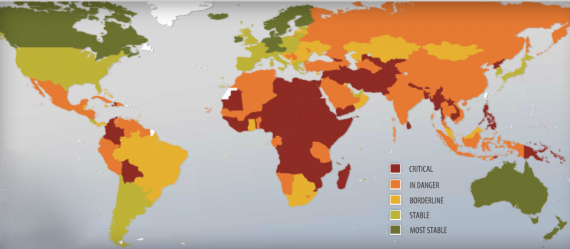Africa, Asia Dominate 2012 “Failed States” Index
Foreign Policy is out today with its 8th annual Failed States index and, as you can see from the map above, the vast majority of these states are in Africa and Asia. In fact, of the twenty nations labeled “failed states,” only four — Colombia, Bolivia, The Philippines, and Papua New Guinea — are not located on those two continents. Walter Russell Mead makes this observation:
Particularly dismal is data on Africa’s broken public services, uneven development, and lawless security forces. Years after independence, a truly massive amount of aid has been sent to complement the continent’s vast mineral resources, and there is still precious little to show for it.
Asia is also straggling: countries such as Nepal, East Timor, Laos and Burma rank distressingly high in areas such as economic decline and the weakening of the state.
There are some surprises; Argentina, for example, is rated as better off than Brazil. The recent turmoil in Greece doesn’t seem fully reflected, either.
Still, the map reminds us that the world remains a wild and unsettling place. The 21st century is unlikely to be a calm and soothing time.
The other thing worth noting of course, is the stretch of failed states that begins in Lebanon and Syria and stretches west and north into Uzbekistan. Not surprisingly, the most dangerous part of the world is currently filled with states that are essentially nations in name only.
As for the Africa situation, one has to think that the fate of Africa is at least in part due to the often arbitrary borders that were drawn at the end of the Colonial Era, borders that didn’t necessarily reflect political, ethnic, or tribal realities. That, combined with unrelenting poverty and a continent that seems unable to support its vast and growing population (currently estimated at one billion people divided among 56 countries), means that for the most part Africa has become an international backwater of neglect and is likely to remain so for quite some time, unless Africans themselves step up to the challenge of creating a better life.
Of course, the other thing to keep in mind is that failed states are often the breeding ground for forces that can cause serious problems for the rest of the world. Based on land mass alone, we’ve got a lot of breeding territory out there, folks.







The underlying problem is that a Westphalian world requires there to be states where states have never been. Unfortunately, there are big chunks of the world, particularly in the area stretching from the Bosphorus to the Indus and in Africa where the “countries” are really city-states with a bit of adjacent territory, surrounded by large expanses of ungoverned territory.
Take Pakistan, for example. We pretend that the Federally Administered Tribal Areas are actually under the control of the central government, that Baluchistan is under the control of the central government, and that it’s just a coincidence that so many in Pakistan’s political leadership come from an area of about 40 square miles surrounding Islamabad.
If history had taken a different course and Africa and Southwest Asia had been able to evolve naturally there likely would be far more nations than there are today. Pakistan (and Bangladesh, formerly known as East Pakistan) is largely a creation of the Muslim rebellion against being ruled by a Hindu majority after the British granted independence. And, of course, India itself is something of a modern creation at least within its current borders.
@Doug Mataconis:
Quite the contrary. I think the natural evolution in Africa and Southwest Asia is no nations. The Arab cities and tribes of Southwest Asia have been ruled by somebody else for, what, 1,000 years? Certainly since the 12th century. What does “evolve naturally” mean in that context?
I think that the divisions of Africa and Southwest Asia are the reason they’ve been ruled by somebody else. Not the other way around.
@Dave Schuler:
Fair point. Positing an alternate reality in this kind of situation is never easy and always a guessing game. But, you make a fair point in that the fact that both regions have historically been, and remain, tied to tribes that would never amount to effective nation-states in the modern sense is a big part of the reason why they are in the state they are today.
Of course, that suggests that stabilizing these parts of the world is a difficult, if not impossible, task.
@Doug Mataconis:
Yeah, that’s what I think. Tom Barnett talks about “the Core” and “the Gap”. I think the distinction is mostly poppycock. “The Core” is the U. S. sphere of influence. “The Gap” is other peoples’, tribes’, and countries’ spheres of influence. “The Gap” in Southwest Asia is, largely, Arabia’s sphere of influence. Its divisions reflect the tribal divisions of Arab culture.
@Dave Schuler:
Yet “The Gap” represents a substantial portion of the world’s population.
What that means for the future I do not know.
Did Illinois or California make the list?
Yeah, I thought of that. I think they grade on the curve.
@Andy:
South Carolina, Mississippi, Louisiana, and Alabama usually come to mind.
@Andy: As someone who grew up in Alabama, you have no clue wtf you are talking about.
Jesus people, it was just a joke – lighten up.
@Andy: “Joke? There are no jokes when my ox is being gored.” — The Humorless Denizens of OTB
NB for the terminally humorless and perpetually snarky: My post is also a joke.
@Boyd:
I’m offended by you making light of cruelity toward animals! 😉